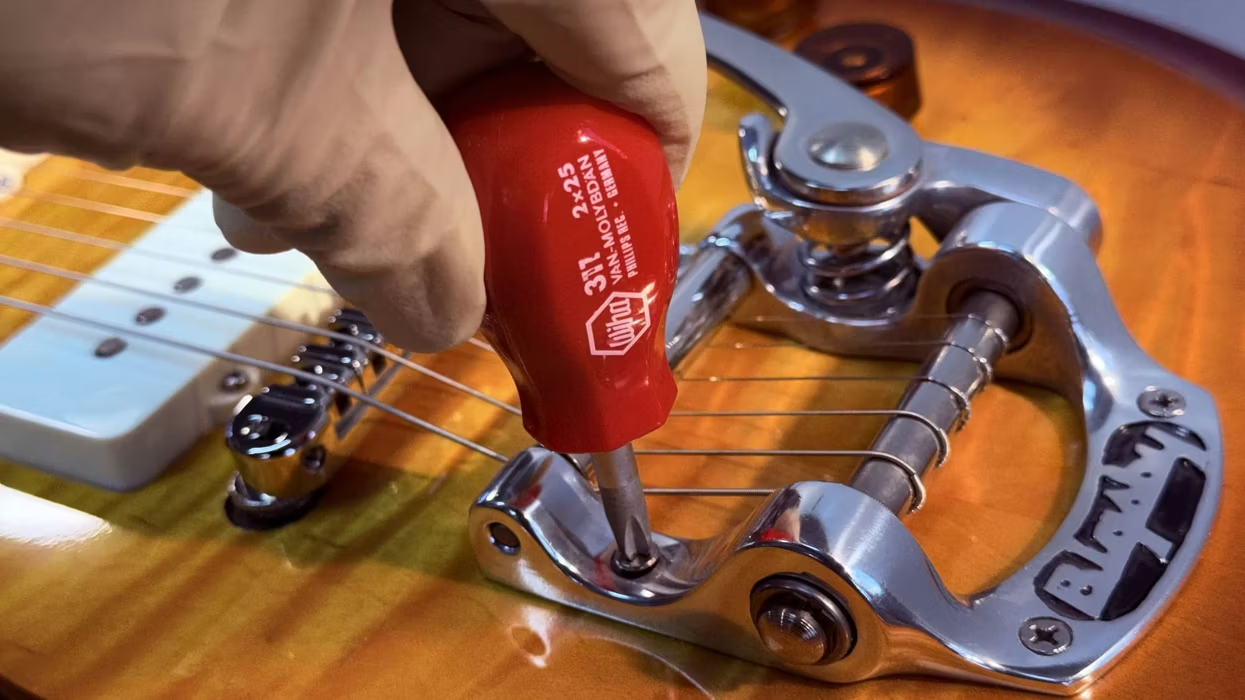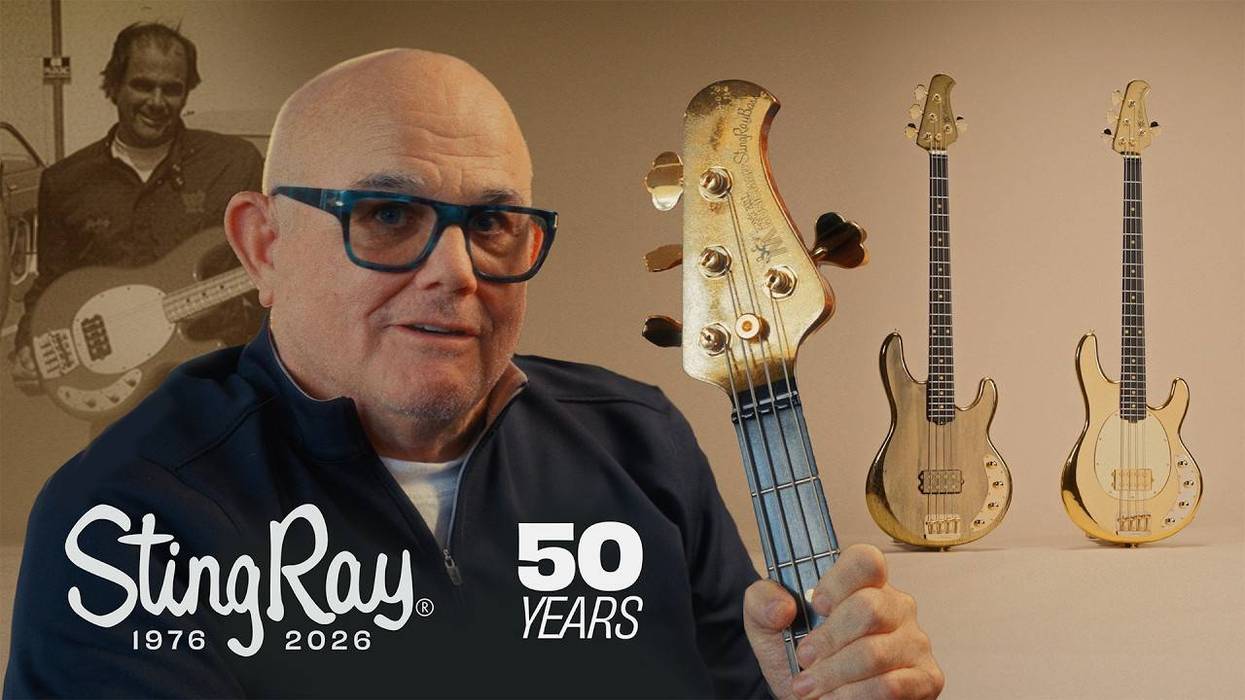I’ve been lucky enough to contribute to
Premier Guitar for over a year now. And I, like
you, love flipping page after page like a child
thumbing a toy catalog at Christmastime. I
read it from cover to cover each month (yes,
even the months when my columns don’t
run). As I turn each page I see guitar gear.
Lots and lots of guitar gear. It is, in fact, a
guitar magazine, and it’s published by some
of the coolest people in this business. People
who get little sleep around deadlines, and
who are constantly on the lookout to bring
you the old, the new, and all things exciting
in “the relentless pursuit of tone.”
I was recently perusing an issue in which a
reader had a problem with the bass features
and products in the magazine. As soon as I
read this, I called my editor and asked if I could
write this column. He told me no, and I did it
anyway. That letter struck a chord (pun intended)
in this bass player’s heart, and I was hoping
to clear up a couple of things regarding what
sounded like a Hatfield-McCoy feud brewing
between bass players and our six-string-playing
brothers and sisters.
Of Sir Paul and Bugs Bunny
I imagine that, sometime in the early ’50s, the
electric bass was handed to the second-best
guitar player in the band. From that point on,
it seems we bass players have had a bad rep.
We’re always the overweight, balding, not-ascool
cliché. And for years we tried to break out
of the mold (and from the back of the stage).
Of course, you, guitar players screwed up
when you made a guitar player switch to bass
in The Quarrymen. Then, almost magically, our
time had come.
If Sir Paul hadn’t come along, our world—your
world, the music world, and the world as a
whole—would be completely different. How
many future guitar players watched Ed Sullivan
when the Beatles debuted and said, “I want to
do THAT!”? Millions? McCartney is a rock star,
and well, he’s a bass player. Mold broken.
But all this talk of “we” and “they,” besides
reminding me of a Bugs Bunny cartoon, is
ridiculous. We are musicians. And as musicians,
we grow, learn, create, and move forward. We
listen, we educate ourselves, and we pull from
other places to hone our personalized sound,
our individuality. We should pull from as many
resources as possible to try and quench our
never-ending thirst for more musical knowledge.
And as you may have found, there is a
lot of knowledge in this magazine.
Ignorance Is Not Bliss
I understand that, as a PG reader, you may
want to just read about the one thing you are
excited about: the guitar. Why, indeed, would
they put bass products in here? The easy
explanation is that many guitar players own
a bass and play it at least occasionally. In this
new age of recording, an awful lot of you are
playing bass parts on your demos (shame!). But
it’s OK. I play guitar on my demos. But when
I’m ready to record master tracks, I call my best
friend—a guitar player.
When tracking an original song, I’ll have a certain
kind of tone in mind as a starting point. But
if I have no idea what words to use to express
that, how on earth am I supposed to relay what
I’m thinking to him? Am I supposed to rely on
him to bring a suitable sound to my creation?
Well, of course I do, because he’s a badass. But
if I need a Tele through a Harvard and he brings
his 7-string through a Triple Rectifier, then we
have a problem. If I didn’t learn through web
clips and publications (like this one), then how
would I know the difference? How would I learn
terms like “Tele” and “Triple Rectifier”? In this
case, ignorance is not bliss.
Likewise, as a guitar player, at some point you
are probably going to play with a bass player.
How do you expect to communicate effectively
if you don’t know where he’s coming from, and
vice versa? If you want to walk around with
blinders on (or, in this, case earmuffs), then go
ahead. But your craft will suffer.
Beyond Blinders and Earmuffs
And let’s take it to another level—just general
knowledge. When I’m touring, one of our activities
is to hit pawnshops, hoping to see that
vintage Strat hanging behind the counter for
$200. I don’t know everything about all guitars,
but I do know what to look for, and it certainly
makes for a much better afternoon. I’d rather
talk about guitar mods or quirky pedals than
about another crappy catered lunch any day.
But I digress. Let’s bring it back to the magazine,
the focus of which is guitar. Again, it is
a guitar magazine, so why on earth was there
an ad for drum recording software recently?
(Software that I promptly sought out, demoed,
and purchased from my local store.) That one
is simple: It’s a product you may be able to
use. Why are there bass products featured
and reviewed? I’m pretty sure that, in every
specialized magazine, there are articles for
complementary products. And PG is no different.
I’ll start my own debate here with the
question, “Then why not drum and keyboard
articles, too?” Because it’s Premier Guitar.
And, the last time I looked, the bass and guitar
were pretty closely related. If you want to
take the debate even further, then email me
and we’ll talk about it.
Whereas some may look at an occasional bass
review as unnecessary, plenty of readers out
there appreciate what this magazine offers to all
players, of all levels. And remember, this magazine
is passed around a lot of busses and a lot
of vans, so why not keep it interesting for everyone?
Except the drummers—they can’t read.
Premier Guitar will not walk around with blinders
(or earmuffs) on. It will continue to bring
the best gear to our attention, and present it in
a way that’s of direct or complimentary interest
to readers. At least that’s my take. But what do
I know? I’m just a….
Steve Cook
Steve Cook is currently fortifying himself in the back of a tour bus, awaiting the low-end revolution. He can be reached at info@shinybass.com until the coast is clear.

















